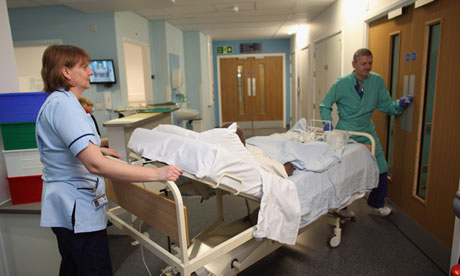Lack of British Sign Language interpreters putting deaf people at risk
Patients are unable to communicate with doctors and other public service professionals

One deaf patient woke up from an operation still not fully understanding what was wrong with her. Photograph: Christopher Furlong/Getty Images
It is traumatic enough being rushed to hospital in an emergency, but what if you couldn't understand the doctors talking to you about what was wrong – and you woke up after an operation still not knowing the full story? That is what happened to profoundly deaf patient Elaine Duncan when she was admitted to Dundee's Ninewells hospital. Although British Sign Language is her first language, Duncan wasn't given access to a sign language interpreter at any point during her 12-day stay, which included surgery to remove her appendix. "I repeatedly pointed to an interpreter services poster on the wall, and I handed staff a BSL interpreter's card on two separate occasions, but I was left abandoned and ignored," she explains. "It was a terrifying experience, leaving me feeling scared and alone, like I was in prison."
Duncan's experience is one of many examples of deaf people being put at risk because they are not given the interpreters they need to communicate with doctors, police and other public sector professionals, says charity Signature, which campaigns to improve standards of communication for deaf and deafblind people. It says the problem is partly caused by a national shortage of BSL interpreters. Latest figures suggest there are 800 registered interpreters for 25,000 sign language users in the UK. But Signature chief executive Jim Edwards says there is also an attitude problem among public service professionals, who expect deaf people to be able to lip-read or to use the written word. "For a deaf person, that won't be their first language, and they won't always follow it," he says. "Sometimes they might have a member of their family there, but their sign language may be limited – and is it appropriate that they should be interpreting when they may be distressed themselves? You need someone independent and professionally trained."
Equality legislation requires "reasonable steps" to be taken to ensure deaf people are not at a "substantial disadvantage". But Signature is urging the government to make the provision of regulated BSL interpreters a legal requirement across the public sector. Edwards says the Francis report into the Mid Staffordshire hospital scandal – which recommended regulation for all those who directly care for patients – provides added impetus. "In the future, if you're a sign language user, the doctor treating you will have to be regulated, but the person affecting your communication – where it really can all go wrong – won't have to be," he points out.
Duncan's case was taken to the Scottish Public Services Ombudsman, which upheld her complaint. NHS Tayside says it has since improved its procedures. But Alana Trusty, manager of the Deaf Links advocacy service, which supported Duncan with her case, says: "This is happening all the time, across all types of service provision. If you were in hospital in France, would you be able to read a consent form or understand someone speaking French at your bedside? That's what it's like for deaf people."
No comments:
Post a Comment